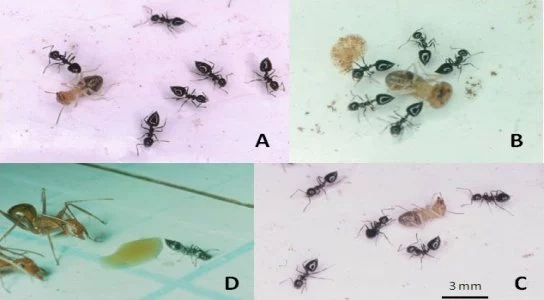The Crematogaster striatula ant, a native African species, has the ability to defend itself and attack prey with a potent venom that can kill termites and paralyze prey from a distance. What makes this species unique is its ability to shoot venom without direct contact with the prey, a phenomenon never before observed in the natural world. These ants can strike their target from a distance of 5 to 10 mm, a short range but enough for the toxin to spread and prove deadly.
The venom of this species is secreted from the Dufour gland, located near the worker ants’ stingers. When facing termites or intruders, the ants use this chemical to paralyze and kill their enemies, while also signaling to summon reinforcements. The venom not only kills termites but also helps repel invading ants. This indicates that Crematogaster striatula ants have not only strong defense capabilities but can also protect their colony from intruding ant species.

“Studies show that the venom of this ant species is particularly dangerous to termites. When attacked, termites usually do not flee like other insects but stand their ground, making them easy targets for paralysis and death.” (Published in 2011, Science Journal). When the venom comes into contact with the thin skin of termites, they are quickly paralyzed and die within 10 minutes. Some studies have shown that in natural environments, when these ants attack termites, the termites are unable to react in time and fall victim to the long-range attack.
“The ability of this ant species to shoot venom from a distance not only opens up a new world of insect attack methods but could also be applied in the research of natural pesticides.”
The ability of these ants to shoot venom from a distance not only opens up a new world of insect attack methods but could also be applied in the research of natural pesticides. If this technology is successfully implemented, we could develop pesticides that are harmless to humans yet highly effective in killing pests. This would be a significant step forward in protecting crops and improving the environment.
Research on the Crematogaster striatula ant shows that not only does it have strong combat capabilities, but it could also help us better understand how to apply natural toxins in agriculture. The chemicals secreted by this ant species could be modified and applied as an effective crop protection method that does not harm humans or animals. When this research is applied in practice, it will not only create a new way to protect crops but also help reduce reliance on harmful chemicals currently used in agriculture.


HPX24h > Animals > The Way African Ants Use Venom to Paralyze Prey from a Distance
Top Reads from This Category
Animals
Why Bedbugs Thrive Through Inbreeding
Animals
Male Spiders Sacrifice Themselves to Protect Future Generations
Animals
The Survival of Orangutans: When Endangered Orangutans Have to Digest Their Own Muscles to Survive
Animals
Explaining How Mosquitoes Can Fly Through a Rainstorm
Animals
The Stunning Image of a Cheetah in Action During Its Hunt
Animals
The Potential of Black Mamba Venom in Developing New Painkillers
Animals
Unexpected Science: When Seismologists Listen to Underwater Earthquakes and Discover Whale Songs
Discover New Topics
Fitness
Effective Training Tips to Enhance Muscular Endurance
Healthy Eating
Foods That Support Depression Reduction: The Latest Scientific Nutritional Choices
Science
Discover Blood Testing Technology Without a Visit to the Doctor
Parenting Tips
Tips for Helping Preschoolers Develop Healthy Sleep Habits
Science
Recreating the Mouse Brain in a Virtual World: The Future of Neuroscience
Health
Chemicals in Tattoo Ink: Are They Linked to Blood and Skin Cancer?
Fitness
The Secret to Holistic Health: Aerobics and Its Role in Preventing Cardiovascular Disease
Science
A New Era in HIV Prevention: Vaccine Set to Launch
Space
Could Our Universe Have Collided With Another Universe Billions of Years Ago?
Space
The Smallest Star System with Three Exoplanets Found by NASA’s Kepler
Parenting Tips
How to Talk to Your Child About Drugs Effectively
Science
Work 3.5 Days a Week and Live to 100: This Could Be Your Future
Space
Scientists Believe Water Ice Could Exist on the Giant Asteroid Vesta